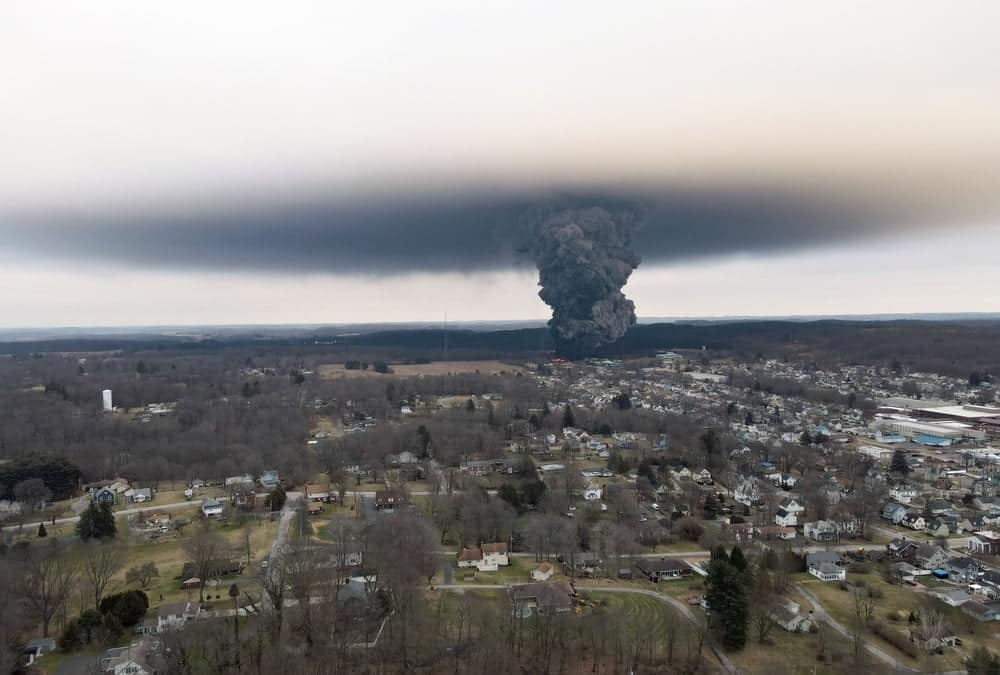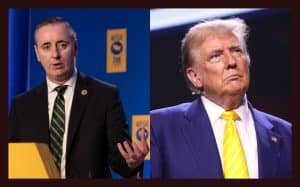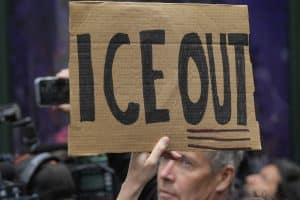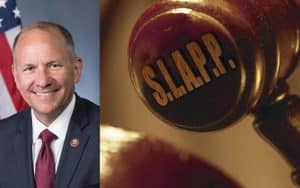The toxic clouds that billowed up from a derailed freight train in Ohio this February are a chilling metaphor for the toxic greed that has infected so many of our big corporations.
After having to evacuate, residents of East Palestine, Ohio are cautiously going back home, but they still don’t know the full extent of the damage to the area’s environment and public health.
The Norfolk Southern train was carrying dangerous chemicals, including vinyl chloride, a highly flammable carcinogen that is more harmful than even ammonia and natural gas, according to federal regulations.
READ: Why Workers Are Up In Arms Over The Rail Strike Intervention
Following the derailment, locals have reported difficulty breathing, numbness in their limbs, and rashes, among other possiblephysical symptoms from the chemical exposure. Worryingly, fish and wildlife in the area have turned up dead.
Unions representing rail workers had warned of the possibility of just such a catastrophe.
In contract negotiations last year, they denounced a business model known as “precision scheduled railroading,” which aims to boost profits by running bigger and faster trains with smaller crews.
The practice has even earned a nickname among rail workers: “positive shareholder reaction.” Combined with a lack of guaranteed sick pay, this created dangerous conditions for overworked rail employees.
And where have those profits gone? To executives and shareholders.
Over the last three years, CEOs at five of the largest railroad conglomerates raked in a staggering $200 million in compensation.
Norfolk Southern and the six other largest U.S. freight railroad companies also spent a staggering $191 billion on stock buybacks and shareholder dividends between 2011 and 2021, making their wealthy executives and investors even richer.
While railroad executives lined their own pockets, their lobbyists advocated against stricter safety rules. In 2017, Trump administration regulators killed provisions requiring rail cars carrying hazardous materials to have more sophisticated, faster braking systems.
This profit-driven approach is putting workers and communities at high risk. In fact, the Ohio accident wasn’t even the only one in February.
Days later in Houston, Texas, another train carrying hazardous materials derailed, killing the driver. Days after that incident, another Norfolk Southern train derailed, this time in southeastern Michigan. And on February 21, a 31-car Union Pacific coal train ran off the rails in Gothenburg, Nebraska, reportedly prompting an emergency hazmat response.
Railroad workers have offered a simple solution to this public threat: public ownership. Railroad Workers United, which brings together members from 12 rail unions, has called for an end to private corporate ownership of the U.S. rail system, as well as the integrated systems in Mexico and Canada.
In its October 2022 resolution, the union said privatized rail prioritizes “massive stock buybacks and other measures that deliver short-term gains for stockholders” over “ the long-term health and vitality of the industry.”
By nationalizing the railroads, we can start treating U.S. rail like the public benefit it is.
Without profit motives to line the pockets of shareholders and CEOs, we could ensure safe staffing for workers, as well as investments in maintenance and safety measures to prevent freight cars from having to use Civil War-era braking technology simply because it’s cheaper.
The United Electrical, Radio, and Machine Workers of America has also called for public ownership, writing: “The railroad companies cannot even be said to be in the business of moving freight; they are merely in the business of using their monopoly control over the nation’s rail infrastructure to squeeze as much profit as possible from customers and workers at the behest of their Wall Street shareholders.”
The Ohio tragedy is a huge, fiery alarm bell. We should no longer tolerate the risk of having greedy corporate executives run us off the rails. Through public ownership, this vital infrastructure could truly serve the public good.
This op-ed was adapted from Inequality.org for syndication by OtherWords.org.







